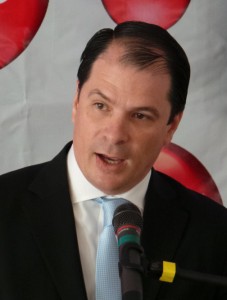Claro Puerto Rico launches subsidized broadband service

Claro Puerto Rico on Wednesday became the first carrier on the island to launch subsidized broadband Internet services for low-income customers, in line with a pilot program the Federal Communications Commission announced late last year.
At this media outlet reported exclusively, Claro received $2.5 million under the FCC’s “Broadband Adoption Lifeline Pilot Program” to bridge Puerto Rico’s digital gap caused by socio-economic circumstances.
During a news conference Wednesday, Claro President Enrique Ortiz de Montellano said the subsizided service bundles a fixed phone line, either two or four megabites of broadband speeds and a tablet computer for either $24.74 or $31.75 a month, depending on the tier of service selected.
“This new initiative — Internet for all subsidized by Claro — is aligned with our commitment to increasingly bring more telecom services to people and putting subsidized Internet service in the hands of those most in need, reducing the digital divide,” he said.
In December 2012, the FCC announced it had included three Puerto Rico telecom providers in a nationwide pilot program that seeks to increase broadband adoption and retention among low-income consumers. Open Mobile, T-Mobile and Claro were among 14 carriers selected to roll out the initiatives in their jurisdictions, getting a little more than $4.1 million combined to launch their projects this year.
Customers will be eligible to take part in the pilot project if they are enrolled in a government assistance program, either local or federal, namely the Nutritional Assistance Program, Section 8, Medicaid and the National School Lunch program, among others.
Through its initiative, Claro expects to benefit about 25,000 Puerto Rico residents, Ortiz de Montellano said, noting that the final tally will depend on the bundle customers choose through November, when the pilot program will conclude.
At that point, the FCC will review the program’s impact, based on metrics and data that Claro is required to provide as part of its agreement with the federal agency. This initiative is the first step the FCC is taking to shift the focus of the Universal Service Fund from subsidizing telephone — or voice — services to broadband.
“Broadband as it pertains to economic development is a universal theme,” Ortiz de Montellano said. “Just two weeks ago, the 7th meeting of the Broadband Commission for Digital Development was held in Mexico City emphasizing that broadband is critical for the prosperity and competitiveness of any country and should be seen as a basic need for human beings.”
At that meeting, Claro owner Carlos Slim described broadband as “the nervous system of the new civilization, something with which we agree,” the local executive added.
“That’s why this step as proposed by the FCC has our full support and attention,” Ortiz de Montellano said.
For now, Claro will offer broadband subsidies to fixed lines only. Customers who already have a home line, but lack Internet connectivity, may add the service under the special program, if they meet eligibility requirements.
To get the word out on the new benefits, Claro will launch a multimedia advertising effort today spanning television, radio, traditional and digital media, Ileana Molina, the carrier’s director of communications, said.















